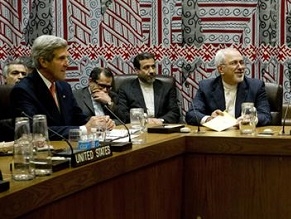|
World Jewish News

In September at the UN in New York: US Secretary of State John Kerry with Iran's Foreign Minister Mohammad-Javad Zarif.
|
Israel calls on world powers meeting in Geneva with Iran ‘not to ease the sanctions prematurely’
15.10.2013, Israel and the World Israel said that a genuine diplomatic solution that peacefully ends Iran's nuclear weapons program ‘’can only be realized if the international community continues to put pressure on Iran and does not ease the sanctions prematurely.’’
‘’It would be an historic mistake not to take full advantage of the sanctions, by making concessions before ensuring the dismantling of Iran's nuclear weapons program,’’ Israel’s security cabinet said in a statement issued as six world powers — the United States, Russia, China, France, Britain (the 5 permanent members of the UN Security Council) plus Germany — will hold formal talks with Iran on its nuclear program in Geneva on Tuesday and Wednesday, the first such meeting of that group since the election of Iranian President Hassan Rouhani in June.
The security cabinet is a small forum within the Israeli Cabinet, headed by the Prime Minister with the purpose of outlining a foreign and defense policy and implementing it.
Israel said any genuine diplomatic solution needs to bring about the dismantling of Iran's nuclear weapons program.
‘’Such a solution would require Iran to comply with Security Council resolutions and other steps which call upon it to: cease all nuclear enrichment, remove from its territory all the stockpiles of enriched uranium, dismantle the underground facilities near Qom and Natanz, including the centrifuges inside them and stop all work on the plutonium-producing heavy water reactor in Arak.’’
‘’Israel does not oppose Iran having a peaceful nuclear energy program. But as has been demonstrated in many countries, from Canada to Indonesia, peaceful programs do not require uranium enrichment or plutonium production. Iran's nuclear weapons program does,’’ the securityu cabinet said.
‘’Israel calls upon the international community not to reach a partial agreement that would fail to bring about the full dismantling of the Iranian military nuclear program, and at the same time, could lead to the collapse of the sanctions regime.’’
The statement adds : ‘’Iran believes it can get by with cosmetic concessions that would not significantly impede its path to developing nuclear weapons, concessions that could be reversed in weeks. In exchange, Iran demands an easing of the sanctions, which have taken years to put in place.’’
‘’The international community must reject Iran’s attempts to reach a deal that leaves it with the capability to develop nuclear weapons and must insist upon a genuine and sustainable agreement.''
The meeting of the so-called ‘P5+1’— follows signals from Iran over the past weeks and months that it wants to thaw frozen relations with the U.S. The leaders of both countries have also underscored the desirability of a deal on Iran's nuclear program.
U.S. officials are treating the talks with cautious optimism just over two weeks after President Barack Obama spoke with Rouhani over the phone about mending relations between the countries. It was the first contact between leaders of the two countries since the 1979 revolution that overthrew the U.S.-backed Shah of Iran.
"No one should expect a breakthrough overnight," a senior U.S. administration official told reporters.
However, the official said Washington was ready to offer Iran rapid relief from economic sanctions if it moved quickly to address concerns that the ultimate goal of its nuclear work was to make bombs.
The American delegation at the talks includes one of its leading sanctions experts — Adam Szubin, director of the Treasury Department's Office of Foreign Assets Control.
On the eve of the talks, European Union foreign policy chief Catherine Ashton, who represents the P5+1 in negotiations, had dinner with Iranian Foreign Minister Mohammad Javad Zarif.
"It remains in the hands of the Iranian regime to engage in meaningful negotiations and take the actions needed to reassure the international community that its program is entirely peaceful - including by implementing its applicable international obligations," said a press release issued Monday by Ashton’s office.
Ashton met with the Iranian Foreign Minister on 26 September on the sidelines of the UN General Assembly in New York and agreed to have a next round of nuclear talks on 15-16 October in Geneva.
"While the European Unions objective remains to develop with Iran a constructive partnership, from which both sides could draw benefits, since 2005 the serious concerns over the Iranian nuclear programme have dominated EU-Iran relations," the press release added.
by: Yossi Lempkowicz
EJP
|
|
